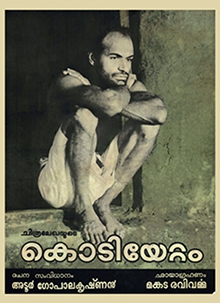
Adoor Gopalakrishnan is an Indian film director, script writer, and producer and is regarded as one of the most notable and renowned filmmakers in India. With the release of his first feature film Swayamvaram (1972), Gopalakrishnan pioneered the new wave in Malayalam cinema during the 1970s. In a career spanning over five decades, Gopalakrishnan has made only 12 feature films to date. His films are made in the Malayalam language and often depict the society and culture of his native state Kerala. Nearly all of his films premiered at Venice, Cannes and Toronto International Film Festival. Along with Satyajit Ray and Mrinal Sen, Gopalakrishnan is one of the most recognized Indian film directors in world cinema.

Aakasha Gopuram is a 2008 Indian Malayalam-language drama film written and directed by K. P. Kumaran. It is a cinematic adaptation of Norwegian writer Henrik Ibsen's 1892 play The Master Builder.
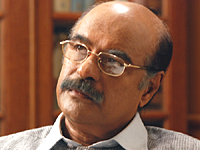
Gopynathan Velayudhan Nair, popularly known by the stage name Bharat Gopy, was an Indian actor, producer, and director. Considered one of the greatest actors in the history of Indian cinema, Gopy was one of the first actors to be associated with the New Wave cinema movement in Kerala during the 1970s.

Swayamvaram is a 1972 Indian Malayalam-language drama film co-written and directed by Adoor Gopalakrishnan, starring Madhu and Sharada in the lead roles. Notable smaller roles were played by Thikkurisi Sukumaran Nair, Adoor Bhavani, K. P. A. C. Lalitha, and Bharath Gopi. The film depicts the life of a couple—Vishwam (Madhu) and Sita (Sharada)—who have married against their parents' wishes and want to start a new life at a new place. The title is an allusion to the ancient Indian practice of a girl of marriageable age choosing a husband from among a list of suitors.
Vidheyan is a 1994 Indian Malayalam-language drama film directed and written by Adoor Gopalakrishnan. It is based on the novella Bhaskara Pattelarum Ente Jeevithavum by Paul Zacharia. The film, starring Mammootty and M. R. Gopakumar, explores the master-slave relationship in a South Karnataka setting.

Vadakke Manalath Govindan Nair popularly known as Kalamandalam Gopi, is an Indian dancer who is an exponent of the classical dance-drama style known as Kathakali.

Rasathanthram (transl. Chemistry) is a 2006 Indian Malayalam-language family drama film written and directed by Sathyan Anthikkad and starring Mohanlal and Meera Jasmine, with Bharath Gopi, Innocent, Oduvil Unnikrishnan, and Mamukkoya in prominent roles. The film was produced by Antony Perumbavoor through Aashirvad Cinemas. The soundtrack album was composed by Ilaiyaraaja, while Alagappan N. handled the cinematography.

Kalamandalam Ramankutty Nair was a performer of Kathakali, who practiced the Kerala art form for more than seven decades.

T. P. Balagopalan M. A. is a 1986 Indian Malayalam-language comedy drama film directed by Sathyan Anthikkad and written by Sreenivasan from a story by Anthikkad. It stars Mohanlal in the title role, along with Shobana, Balan K. Nair, Kuthiravattam Pappu, Maniyanpilla Raju, Sreenivasan, Sukumari, and K. P. A. C. Lalitha. The story follows T. P. Balagopalan, who struggles to make ends meet, and his romantic life with Anitha.
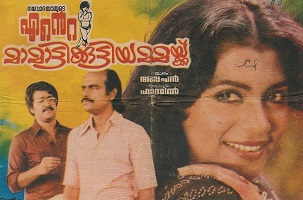
Ente Mamattukkuttiyammakku is a 1983 Indian Malayalam-language family drama film produced by Navodaya Appachan under Navodaya Studio. It was written and directed by Fazil and stars Bharat Gopy, Mohanlal, Shalini, Poornima Jayaram, and Sangeeta Naik. The film was reported to be heavily inspired by the 1982 film Annie.
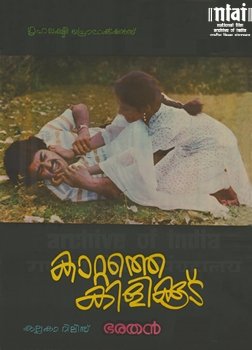
Kattathe Kilikkoodu is a 1983 Indian Malayalam-language drama film directed by Bharathan and written by T. Damodaran from a story by Nedumudi Venu. The film was produced by P. V. Gangadharan and stars Bharat Gopy, Mohanlal, Srividya, Revathi, and Anju. The music for the film was composed by Johnson. The film was a major commercial success.

Patheyam is a 1993 Indian Malayalam-language drama film directed by Bharathan, based on a screenplay by A. K. Lohithadas. The film stars Mammootty and Chippy in lead roles, along with Nedumudi Venu, Sasikala, Bharat Gopy and Oduvil Unnikrishnan in supporting roles. The film revolves around Chandradas, a writer of repute, who comes across Haritha Menon, his daughter after a lapse of 15 years, at a school function in Kodaikanal.
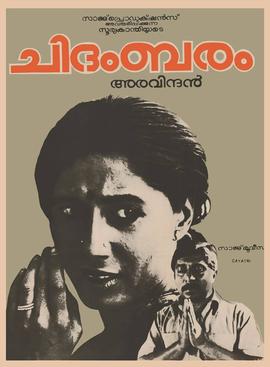
Chidambaram. is a 1985 Malayalam film written, directed and produced by G. Aravindan. It is the film adaptation of a short story by C. V. Sreeraman. The film explores various aspects of relations between men and women through the lives of three people living in a cattle farm. Themes of guilt and redemption are also dealt with. Bharath Gopi, Smita Patil, Sreenivasan and Mohan Das play the lead roles. It won the National Film Award for Best Feature Film and five Kerala State Film Awards including Best Film and Best Direction.
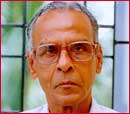
Mankada Ravi Varma was an Indian cinematographer and director who worked in Malayalam cinema. He is exclusively known for his association with renowned film-maker Adoor Gopalakrishnan. He has associated with other major directors such as G. Aravindan and P. N. Menon. He has also directed two films. He has won two National Film Awards and seven Kerala State Film Awards in various categories. In 2006, he was honoured with the J. C. Daniel Award, Kerala government's highest honour for contributions to Malayalam cinema.

Vida Parayum Munpe is a 1981 Malayalam-language drama film directed by Mohan, written by John Paul and produced by Innocent and David Kachappilli. The film stars Prem Nazir and Nedumudi Venu in lead roles, while Lakshmi, Innocent, Bharath Gopy, and Sankaradi play supporting roles. The film is a loose adaptation of the Hrishikesh Mukherjee's 1971 Anand, which was itself an adaptation of Akira Kurosawa's 1952 classic Ikiru.

Rachana is a 1983 Indian Malayalam film, directed by Mohan and produced by Sivan Kunnampilly. The film stars Srividya, Nedumudi Venu, Bharath Gopi and Mammootty in the lead roles. The film has musical score by M. B. Sreenivasan. Bharath Gopi won the Kerala State Film Award for Best Actor and the Kerala Film Critics’ Award for Best Actor for his performance in the film. Srividya won the Kerala State Film award for Best Actress for her performance in the same movie.

Ee Adutha Kaalathu is a 2012 Indian Malayalam-language black comedy crime film written by Murali Gopy and directed by Arun Kumar Aravind. The film marks the second directorial venture by Arun Kumar Aravind, after his notable directorial debut Cocktail (2010). Kerala State Award winning cinematographer Shehnad Jalal handled the camera.
Krishnankutty Nair was an Indian actor who worked in Malayalam cinema. He was from Pippinmoodu, near Sasthamangalam, Thiruvananthapuram, Kerala. Nair worked with various theatre groups before becoming a film actor.
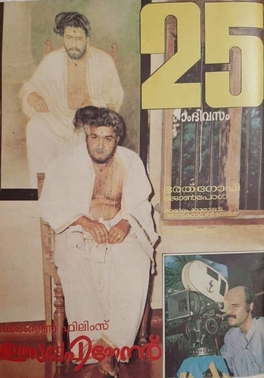
Ulsavapittennu is a 1988 Indian Malayalam-language drama film directed by Bharath Gopi and written by John Paul. The film stars Mohanlal, Parvathy Jayaram, Jayaram, and Sukumaran in the lead roles. The film has musical score composed by G. Devarajan.
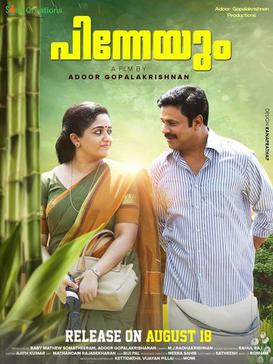
Pinneyum is a 2016 Indian Malayalam-language Biographical crime thriller film written, co-produced, and directed by Adoor Gopalakrishnan. Businessman Baby Mathew Somatheeram co-produced the film. The film portrays a love story where Dileep and Kavya Madhavan star in the lead roles. This film was loosely adapted from the murder incident in Kerala during 1984 by Sukumara Kurup, a wanted criminal.
